-
 Bitcoin
Bitcoin $80,256.8277
-6.72% -
 Ethereum
Ethereum $2,139.6487
-9.13% -
 Tether USDt
Tether USDt $0.9993
0.01% -
 XRP
XRP $2.0520
-7.72% -
 BNB
BNB $577.5820
-5.78% -
 Solana
Solana $132.4008
-5.62% -
 USDC
USDC $0.9999
-0.01% -
 Dogecoin
Dogecoin $0.1884
-9.74% -
 Cardano
Cardano $0.6047
-9.43% -
 TRON
TRON $0.2238
-2.11% -
 Litecoin
Litecoin $120.2950
-7.04% -
 Chainlink
Chainlink $13.9804
-10.03% -
 Avalanche
Avalanche $21.3612
-7.31% -
 UNUS SED LEO
UNUS SED LEO $9.2384
0.03% -
 Sui
Sui $2.6391
-9.14% -
 Stellar
Stellar $0.2643
-8.74% -
 Toncoin
Toncoin $3.2410
-6.71% -
 Hedera
Hedera $0.1895
-5.24% -
 Shiba Inu
Shiba Inu $0.0...01339
-8.56% -
 Polkadot
Polkadot $4.6435
-7.59% -
 MANTRA
MANTRA $7.2563
-0.49% -
 Hyperliquid
Hyperliquid $19.6890
-5.95% -
 Ethena USDe
Ethena USDe $0.9989
-0.04% -
 Bitcoin Cash
Bitcoin Cash $283.4186
-5.32% -
 Dai
Dai $0.9999
0.03% -
 Bitget Token
Bitget Token $3.8033
-7.18% -
 Uniswap
Uniswap $7.3241
-10.59% -
 Monero
Monero $209.9598
-1.83% -
 Aptos
Aptos $5.8729
-3.73% -
 NEAR Protocol
NEAR Protocol $2.8763
-6.77%
There are several ways to purchase altcoins
Understanding altcoins and their role in the cryptocurrency landscape is essential for making informed investment decisions.
Jan 03, 2025 at 05:28 am

Key Points:
- Understanding altcoins and their role in the cryptocurrency landscape
- Exploring various methods to acquire altcoins: exchanges, peer-to-peer marketplaces, and mining
- Identifying reputable exchanges for purchasing altcoins
- Navigating peer-to-peer marketplaces for secure transactions
- Understanding the implications of exchange fees and transaction costs
- Recognizing the risks associated with altcoin investments and mitigating potential losses
- Tips for researching and selecting altcoins, including due diligence and risk assessment
How to Purchase Altcoins: A Comprehensive Guide
1. Understanding Altcoins
Altcoins, a portmanteau of "alternative coins," encompass all cryptocurrencies other than Bitcoin. They emerged as alternatives to Bitcoin, offering unique features, functionalities, or protocols. The cryptocurrency market consists of a vast array of altcoins, each with its specific characteristics, value propositions, and objectives.
2. Choosing a Purchasing Method
There are several reputable methods to purchase altcoins:
a. Centralized Exchanges
Centralized exchanges, such as Coinbase, Binance, Kraken, and Gemini, provide a convenient platform for buying and selling altcoins. They act as intermediaries between buyers and sellers, holding users' funds and facilitating transactions. Centralized exchanges offer a user-friendly interface, support for multiple currencies, and access to a wide range of altcoins. However, they may charge fees for transactions and may require users to undergo identity verification processes.
b. Decentralized Exchanges (DEXs)
DEXs operate on a peer-to-peer model, connecting buyers and sellers directly without an intermediary. They prioritize anonymity and decentralized control, allowing users to maintain custody of their private keys. Platforms like Uniswap, PancakeSwap, and SushiSwap facilitate decentralized trading, but may require technical expertise to navigate and may offer limited liquidity for certain altcoins.
c. Peer-to-Peer (P2P) Marketplaces
P2P marketplaces, such as LocalBitcoins and Paxful, enable individuals to trade altcoins directly with each other without the involvement of a third party. These platforms provide flexibility and anonymity, but require due diligence to mitigate the risk of fraud or scams.
d. Mining
Mining involves solving complex computational problems using specialized hardware to validate transactions and create new blocks on a blockchain network. Miners can earn rewards in the form of altcoins for their contributions to network security and maintenance. However, mining requires significant technical knowledge, specialized equipment, and substantial energy consumption.
3. Selecting a Reputable Exchange
When choosing a centralized exchange to purchase altcoins, consider the following factors:
a. Security and Reputation
Opt for exchanges with a proven track record of security, strong cybersecurity measures, and a positive reputation within the cryptocurrency community.
b. Trading Volume and Liquidity
Ensure the exchange has a high trading volume and liquidity for the altcoins you want to trade, as this affects the ease and speed of execution.
c. Supported Fiats and Altcoins
Confirm that the exchange supports both the fiat currencies and altcoins you need.
d. Fees and Payment Options
Compare transaction fees, withdrawal fees, and supported payment methods to find the most cost-effective and convenient options.
4. Navigating Peer-to-Peer Marketplaces
To safely navigate peer-to-peer marketplaces when buying altcoins:
a. Verify Counterparties
Thoroughly research and verify the reputation and trustworthiness of potential trading partners before engaging in transactions.
b. Use Escrow Services
Utilize escrow services to protect your funds by holding them in a neutral account until both parties fulfill their obligations.
c. Monitor Transactions Closely
Pay attention to exchange rates, transaction fees, and wallet addresses to avoid potential scams or errors.
5. Understanding Fees and Transaction Costs
Be aware of the following types of fees associated with altcoin purchases:
a. Trading Fees
Centralized exchanges charge trading fees, usually a percentage of the trade value, to facilitate transactions. DEXs, while typically having lower trading fees, may charge network fees or gas fees to cover blockchain transaction costs.
b. Withdrawal Fees
Withdrawals from
Disclaimer:info@kdj.com
The information provided is not trading advice. kdj.com does not assume any responsibility for any investments made based on the information provided in this article. Cryptocurrencies are highly volatile and it is highly recommended that you invest with caution after thorough research!
If you believe that the content used on this website infringes your copyright, please contact us immediately (info@kdj.com) and we will delete it promptly.
- Binance Completes Community Vote on Pi Coin (PI) Listing
- 2025-02-28 18:25:32
- Will Pi Coin's Potential Binance Listing Revolutionize the Crypto Market?
- 2025-02-28 18:25:32
- Pi Network Coin Promises a Beacon of Hope Amidst Turbulent Crypto Market
- 2025-02-28 18:25:32
- Binance Unveils Support For Ethernity Chain Token Swap; Here's All You Need To Know
- 2025-02-28 18:25:32
- Shares of Coinbase Global (NASDAQ:COIN) Have Earned a Consensus Recommendation of “Moderate Buy”
- 2025-02-28 18:25:32
- Arctic Pablo Coin: The Icy Adventurer Leading the Meme Coin Presale Revolution
- 2025-02-28 18:25:32
Related knowledge
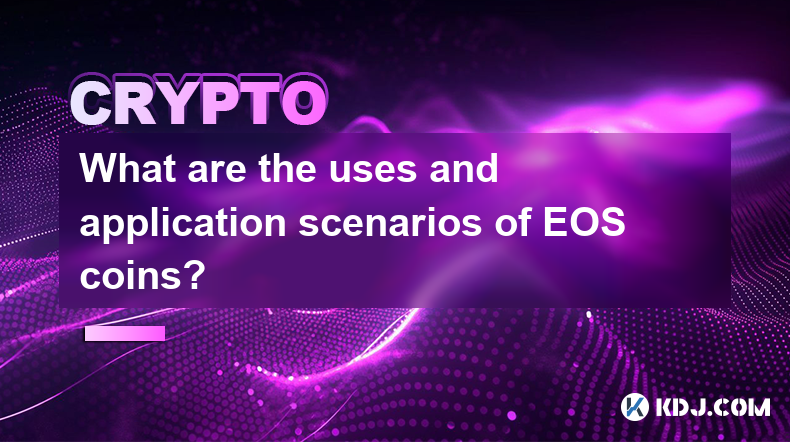
What are the uses and application scenarios of EOS coins?
Feb 26,2025 at 09:54pm
EOS: Decentralized Infrastructure for Scalable Blockchain ApplicationsKey Points:EOS enables the creation and deployment of decentralized applications with unparalleled scalability and efficiency.Its unique architecture features a high-throughput blockchain with zero transaction fees and the ability to process millions of transactions per second.EOS is ...
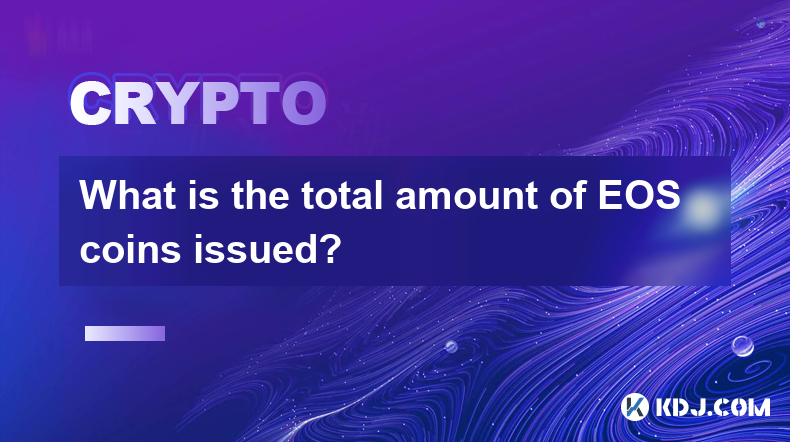
What is the total amount of EOS coins issued?
Feb 26,2025 at 06:24pm
Key PointsTotal Supply: Understand the concept of initial supply and its impact on EOS tokenomicsSupply Dynamics: Explore the various factors that affect EOS supply, including inflation and staking incentivesMarket Capitalization vs. Circulating Supply: Delve into the nuances between these metrics and their significance in token valuationDistribution an...
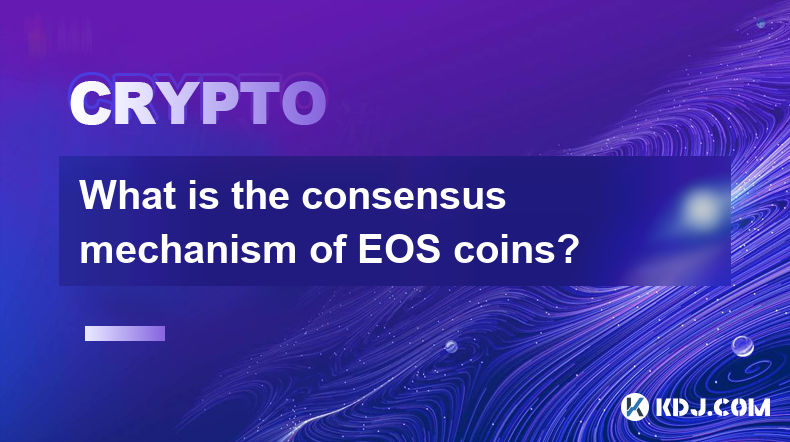
What is the consensus mechanism of EOS coins?
Feb 26,2025 at 11:19am
Key Points:EOSIO: The Foundation of EOS's Consensus MechanismDPOS: Delegated Proof-of-StakeBlock Producer ElectionsContinuous Block ProductionBlock Validation and IrreversibilityConsensus and Fork PreventionCommunity Governance and VotingWhat is the Consensus Mechanism of EOS Coins?EOS, an innovative blockchain platform, employs a unique consensus mecha...
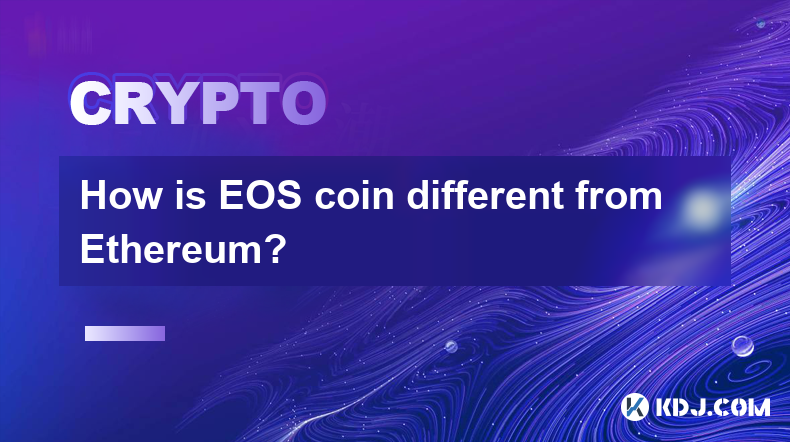
How is EOS coin different from Ethereum?
Feb 26,2025 at 10:48am
Key Points:Overview of EOS and EthereumDifferences in Consensus MechanismsAdvantages and Limitations of Each PlatformUse Cases and Target AudiencesComparison of Transaction Fees and ScalabilityCommunity Support and Development ActivityHow is EOS Coin Different from Ethereum?1. Overview of EOS and EthereumEOS and Ethereum are two of the most popular bloc...
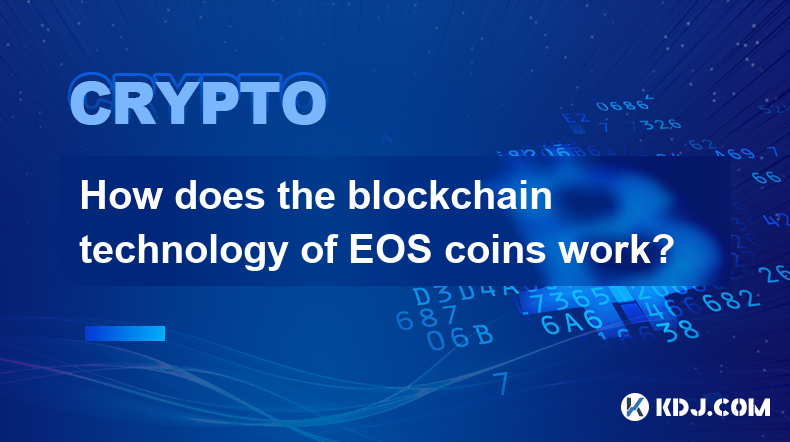
How does the blockchain technology of EOS coins work?
Feb 25,2025 at 11:13pm
Key PointsEOS is a blockchain platform that provides a high-throughput and scalable solution for decentralized applications.EOS uses a delegated proof-of-stake (DPoS) consensus mechanism to elect block producers and maintain the blockchain.EOSIO, the open-source software that powers EOS, offers a range of developer tools and features to facilitate the c...
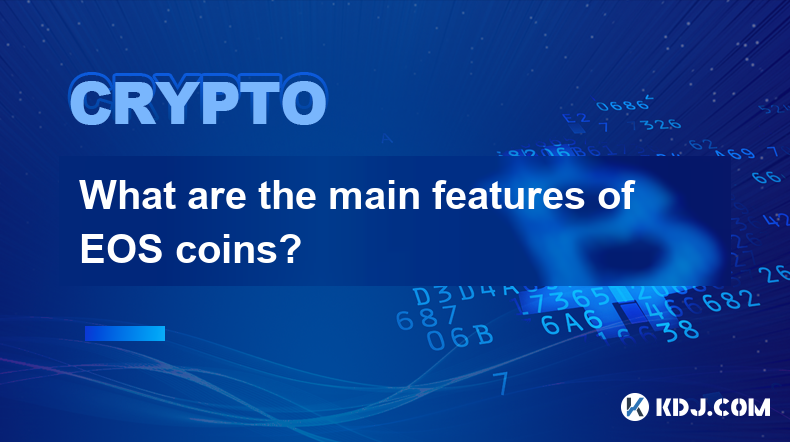
What are the main features of EOS coins?
Feb 27,2025 at 04:36pm
Key Points:EOS is a decentralized blockchain platform designed for building scalable and secure applications.EOS uses a unique consensus mechanism called Delegated Proof of Stake (DPoS), which improves transaction speed and efficiency.EOS has a robust ecosystem with a wide range of decentralized applications (dApps) and tools.EOS is known for its low tr...

What are the uses and application scenarios of EOS coins?
Feb 26,2025 at 09:54pm
EOS: Decentralized Infrastructure for Scalable Blockchain ApplicationsKey Points:EOS enables the creation and deployment of decentralized applications with unparalleled scalability and efficiency.Its unique architecture features a high-throughput blockchain with zero transaction fees and the ability to process millions of transactions per second.EOS is ...

What is the total amount of EOS coins issued?
Feb 26,2025 at 06:24pm
Key PointsTotal Supply: Understand the concept of initial supply and its impact on EOS tokenomicsSupply Dynamics: Explore the various factors that affect EOS supply, including inflation and staking incentivesMarket Capitalization vs. Circulating Supply: Delve into the nuances between these metrics and their significance in token valuationDistribution an...

What is the consensus mechanism of EOS coins?
Feb 26,2025 at 11:19am
Key Points:EOSIO: The Foundation of EOS's Consensus MechanismDPOS: Delegated Proof-of-StakeBlock Producer ElectionsContinuous Block ProductionBlock Validation and IrreversibilityConsensus and Fork PreventionCommunity Governance and VotingWhat is the Consensus Mechanism of EOS Coins?EOS, an innovative blockchain platform, employs a unique consensus mecha...

How is EOS coin different from Ethereum?
Feb 26,2025 at 10:48am
Key Points:Overview of EOS and EthereumDifferences in Consensus MechanismsAdvantages and Limitations of Each PlatformUse Cases and Target AudiencesComparison of Transaction Fees and ScalabilityCommunity Support and Development ActivityHow is EOS Coin Different from Ethereum?1. Overview of EOS and EthereumEOS and Ethereum are two of the most popular bloc...

How does the blockchain technology of EOS coins work?
Feb 25,2025 at 11:13pm
Key PointsEOS is a blockchain platform that provides a high-throughput and scalable solution for decentralized applications.EOS uses a delegated proof-of-stake (DPoS) consensus mechanism to elect block producers and maintain the blockchain.EOSIO, the open-source software that powers EOS, offers a range of developer tools and features to facilitate the c...

What are the main features of EOS coins?
Feb 27,2025 at 04:36pm
Key Points:EOS is a decentralized blockchain platform designed for building scalable and secure applications.EOS uses a unique consensus mechanism called Delegated Proof of Stake (DPoS), which improves transaction speed and efficiency.EOS has a robust ecosystem with a wide range of decentralized applications (dApps) and tools.EOS is known for its low tr...
See all articles

















































































